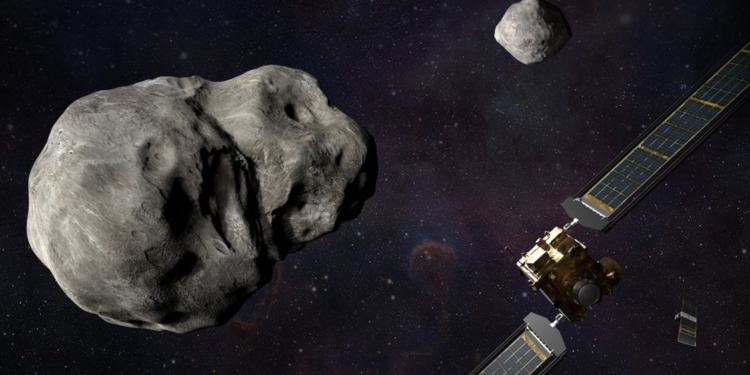On Monday, NASA’s first planetary defense technology demonstration proved successful when it hit the asteroid Dimorphos.
The mission known as DART (Double Asteroid Redirection Test) made impact at 7:15 p.m. ET after 10 months of navigating through outer space for a target that lies some 11 million kilometers (7 million miles) from Earth.
The asteroid was not a threat to Earth, but was used as a demonstration to determine the best way to prevent asteroids from hitting Earth in the future — the outcomes paving way to a secure future.
IMPACT SUCCESS! Watch from #DARTMIssion’s DRACO Camera, as the vending machine-sized spacecraft successfully collides with asteroid Dimorphos, which is the size of a football stadium and poses no threat to Earth. pic.twitter.com/7bXipPkjWD
— NASA (@NASA) September 26, 2022
DART makes impact
After roughly 10 months of scavenging outer space for the perfect test subject, scientists identified Dimorphos, a small body just 530 feet (160 meters) in diameter that orbits a larger 2,560-foot (780 meter) asteroid called Didymos.
Astronomers had found Didymos roughly two years ago. Images from the spacecraft Didymos Reconnaissance and Asteroid Camera for Optical navigation helped the DART team direct an impact with the smaller asteroid Dimorphos.
The successful test mission carried out Monday didn’t destroy Dimorphos, but rather collided with the asteroid in order to redirect its course — something called kinetic impact.
The spacecraft hit the Dimorphos at 13,241 miles per hour, which is expected to change the position of the asteroid by 1%. Although the number seems small, the impact is expected to change the moon’s orbital path enough to set it on a different course.
The collision was recorded by LICIACUBE, Light Italian CubeSat for Imaging of Asteroids, which used a companion cube satellite provided by the Italian Space Agency to follow the spacecraft.
Just minutes after impact, the CUBESAT flew past Dimorphos and captured several photos. The pictures are expected to be streamed back to Earth in the next few days or weeks.
Now, post-impact, the investigative team at John Hopkins Applied Physics Laboratory will use ground-based telescopes to monitor the asteroid and to determine whether DART impact altered Dimorpphos’s course around Didymos.
The team noted it would take 2 months to get the results.
The mission was NASA’S first full-scale demonstration of deflection technology, something that could prove to be essential in Earth’s future.
John Hopkins APL Director Ralph Semmel talked about the importance of DART and what it could mean for the future:
“This first-of-its-kind mission required incredible preparation and precision, and the team exceeded expectations on all counts. Beyond the truly exciting success of the technology demonstration, capabilities based on DART could one day be used to change the course of an asteroid to protect our planet and preserve life on Earth as we know it.”
A demonstration with future implications
According to NASA’s Planetary Defense Coordination Office, the total number of near-Earth hitting asteroids in 2019, known as NEOs (near-Earth objects), was 19,000 — making up an average of 30 new discoveries each week.
Just 3 years prior on October 13, 2016 , near-Earth asteroids were at 15,000, marking a 50% increase in asteroids falling to Earth since 2013 — when the number had been at 10,000.
Since 1998 when NASA established the Near-Earth Object Observations Program, the agency has been developing ways to deter NEOs.
One monitoring body for NEOs is the Jet Propulsion Laboratory’s Center, which was given the task of determining an asteroid’s orbit, how soon collisions would be and other asteroid-related questions that can be found on their web page.
The latest mission by NASA is revolutionary as it is the first successful test ever to attempt to deflect asteroids from Earth.
“DART’s success provides a significant addition to the essential toolbox we must have to protect Earth from a devastating impact by an asteroid,” said Lindley Johnson, NASA’s Planetary Defense Officer. “This demonstrates we are no longer powerless to prevent this type of natural disaster. Coupled with enhanced capabilities to accelerate finding the remaining hazardous asteroid population by our next Planetary Defense mission, the Near-Earth Object (NEO) Surveyor, a DART successor could provide what we need to save the day.”
Although asteroid collisions seem far-fetched, NASA reports every day 80 to 100 tons of materials fall upon Earth in either forms of dust or small meteorites, and, over the past 20 years, roughly 600 small asteroids a few meters in size have entered Earth’s atmosphere.
As the naturally occurring process of asteroids in outer space continues, it is important technological advancements are made to deter what could be a highly possible and life-ending event on Earth.
Already, NASA’s DART test is off to a good start — and hopefully, will help humanity avoid the fateful death of the dinosaurs, notoriously wiped out by an asteroid.
Editor’s Note: The opinions expressed here by the authors are their own, not those of Impakter.com — In the Featured Photo: Illustration showing NASA’s DART spacecraft and the Italian Space Agency’s LICIACube before impact. Source: Steve Gribben/John Hopkins APL/NASA.










